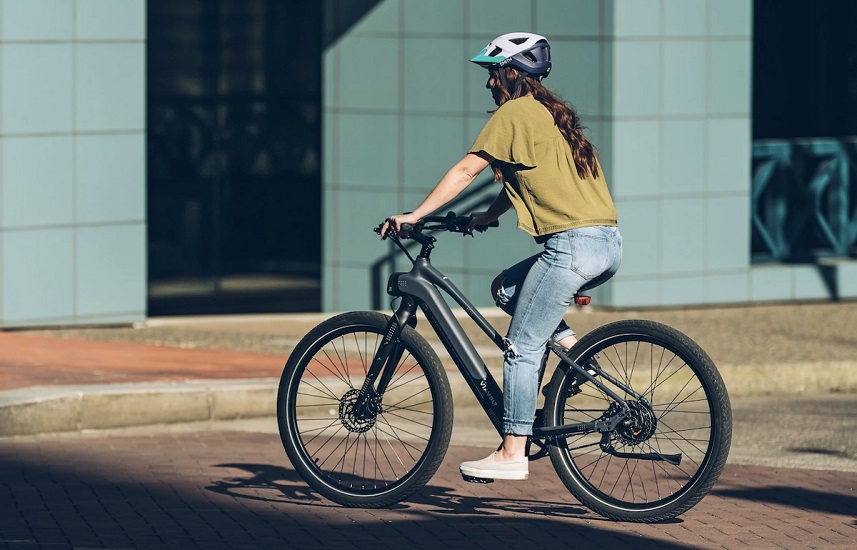Ebike Industry Updates
Some links may be affiliate links. We may get paid if you buy something or take an action after clicking one of these.
E-bike ownership skews young, as does participation in bike share programs, while conventional bike ownership skews toward affluent, educated men.
Young adults aged 25-34 were found to have the highest rate of ownership of e-bikes as well as the highest rate of participation in bike share programs. They also had a lower rate of conventional bike ownership.
Regular bike ownership skewed toward those who were male, young, highly educated and affluent. No surprise there.
The study found that factors such as being foreign-born, paying rent (rather than a mortgage) and living in an apartment reduced the likelihood of owning a bike, whether conventional or electric.
Sponsor

Some links may be affiliate links. We may get paid if you buy something or take an action after clicking one of these.
Atlanta’s e-bike rebate program received more than 4,500 applications in the first 12 hours the page was live.
By the time the application window closed on June 23, the city had received nearly 9000 applications.
Depending on your view, that is either good or bad news, possibly both. The overwhelming response shows just how keen people are to add an e-bike to their transportation options, which is certainly good. The bad news is that only 700 rebate vouchers are available in this first round.
Income-qualified Atlanta residents (those who demonstrate they meet the threshold to qualify as low income) can receive a rebate certificate good for $1,000 off a regular e-bike or $2,000 off a cargo e-bike. Residents who exceed the income threshold can receive a rebate of up to $500 for an e-bike or $1,000 for a cargo e-bike.
The first round of rebates should be distributed to recipients by the end of July. Recipients will have six weeks to purchase their e-bike from a qualified Atlanta retailer.
Some links may be affiliate links. We may get paid if you buy something or take an action after clicking one of these.
The famed Italian brand has introduced a road e-bike that weighs just 24 lbs. and its Mahle X30 hub produces a spirited 45Nm of torque.
And now, for everyone who needs some help going 20 mph, the Bianchi E-Oltre adds the Mahle X30 hub motor to yield one of the lightest e-bikes on the market—just 11kg (24.2 lbs.)—light enough to rival Trek’s Domane+ SLR. It wasn’t that many years ago that a racing bike weighed 24 lbs.
The Mahle X30 hub in the E-Oltre produces 250W and 45Nm of torque. It’s unlikely that another e-bike could put this hub to use as well as the E-Oltre; 45Nm of torque will see this e-bike accelerate like other e-bikes with much bigger motors while still retaining the feel of a regular road bike. This may be as close as some of us come to keeping the cake we are eating.
The Mahle X30 hub draws its power from a 250Wh internal battery that Bianchi says can offer as much as 90km (56 mi.) range on a single charge. It seems unlikely that such a small battery has ever accounted for so much range. Mahle makes a range-extending battery that is estimated to add another 55km (34 mi.).
Bianchi offers the E-Oltre in seven different sizes to give riders an optimal fit. They also make it in three different versions. One is equipped with Shimano’s 105 group and goes for around $5,500. There’s one with Shimano’s Ultegra Di2 electronic shifting that runs close to $7,000, while the top-of-the-line version with Shimano’s Dura-Ace Di2 goes for close to $11,000.
Some links may be affiliate links. We may get paid if you buy something or take an action after clicking one of these.
Completely automatic shifting comes to this combination mid-drive motor/gearbox while still offering riders adjustability and manual override.
Automatic shifting is a software update that improves upon what Pinion already offered with the MGU. Previously, Pinion offered a mode called Pre.Select that would change gears while the rider was coasting. I would compare the rider’s speed compared to a preset target cadence and then select the gear most appropriate to that cadence. Now Pinion has added two more shift modes, Auto.Shift and Auto.Shift.Pro.
With Auto.Shift the MGU automatically shifts—even under a full pedaling load. Pinion is careful to note that the automatic shifting isn’t predictive, but instead is reactive. The system monitors a number of inputs, according to Pinion, and while they don’t detail those inputs, it’s easy to connect the dots and conclude that some of those inputs would be cadence, speed and the amount of torque the rider is exerting on the pedals.
Because cadence is to some degree a matter of personal preference and riding style, Pinion allows a rider to define their preferred cadence range so that the MGU doesn’t shift at cadences above or below the rider’s preferred range. They can do this dynamically while riding with the TE-1 E-Trigger.
Pinion also offers Auto.Shift.Pro which allows riders to override the gear that the Pinion MGU has selected by using the E-Trigger. Pinion says this allows a rider to derive all the assistance of an automatic transmission without losing the dynamic edge that comes with shifting manually.
Some links may be affiliate links. We may get paid if you buy something or take an action after clicking one of these.
The management consultants believe the market will grow by $180 billion by the end of the decade and then another $180 billion in just five more years.
These numbers reflect the size of the worldwide market, rather than one region. According to their analysis, they peg the current worldwide market at $160 billion dollars. By 2030, they predict the market will grow by $180 billion to $340 billion. That will grow another $180 billion in just five years to a total of $520 billion.
According to McKinsey, the biggest drivers will be regulation and consumer behavior. Regulation will figure as a driver because of how governments will prioritize forms of transportation that help them meet their climate targets. Subsidies and investment in micromobility infrastructure will help spur consumer behavior.
Currently, five European countries account for a whopping 50 percent of the market, some $29 billion in sales. Germany leads, with France coming in second and the U.K. third.
E-bikes the biggest segment of the European micromobility market, they say; e-bikes account for 40 percent of the total market. They project that e-bike sales will grow by 13 percent annually through 2035.
Everyone seems to be releasing “smart” products, but few of them really seem to be all that intelligent. A new brand, Tarran, claims to have designed and built the first “smart” cargo e-bike, one that comes with landing gear to stabilize the riding experience.
Cargo e-bikes may be the wave of the future for many of us who hope to ride an e-bike for more of our trips, but many potential cargo e-bike owners and riders face a hurdle: The more weight you put in or on the cargo e-bike, the harder it will be to handle. Heavy loads are most difficult when starting and stopping, which is that the Tarran T1 Pro is meant to address.
The Tarran T1 Pro is a classic box-style cargo e-bike with a sizable cargo area in front of the driver, with the capacity to carry kids, pets, groceries and more. It features a proprietary mid-drive motor that produces 100Nm of torque. It is powered by a whopping 1500Wh battery that is estimated to offer riders up to 200km (124 mi.) of range per charge. The drivetrain combines an Enviolo continuously variable hub with a Gates carbon belt for smooth, quiet operation that will always offer the riders the perfect gear.
While there are a number of features that make the Tarran T1 Pro a very different cargo e-bike, the “landing gear” feature is unique so far as we know. Tarran’s proprietary Dynamic Dual-Drive Landing Gear uses stress, angle and speed sensors to know when to lower two small wheels hidden inside the cargo box. When deployed, they prevent the Tarran T1 Pro from tipping onto its side, no matter how heavy the load is. And the load can be quite heavy, thanks to a weight capacity of 220kg (485 lbs.).
When slowing while braking, the wheels deploy and then retract once the rider is back up to a sufficient speed to maintain stability. They can also be deployed so that they can assist a rider when pushing the T1 Pro, such as when parking it. Finally, they feature a kickstand mode that will support the e-bike when parked.
First up, the posture and frame sizing. The riding posture on the Euphree Stellar Falcon feels like a commuter bike with a slight rise in the handlebar, ergonomic grips, and step-through frame geometry. The wide handlebars and short stem create a hybrid position—not fully upright like a cruiser and not fully forward like a mountain bike, but somewhere in the middle.
For frame sizing, the Euphree Stellar Falcon offers configurations that should fit most people. The step-through version we tested has a low standover height, making mounting and dismounting easy.
Next, suspension and tires. The Euphree Stellar Falcon stands out with its air fork suspension, which offers preload and lockout options. If you’ve never ridden a bike with an air fork, it’s miles ahead of coil springs in performance and comfort. Preload adjusts the fork to match your weight and riding style, making bumps smoother. Lockout turns off the suspension on flat surfaces, so you don’t lose pedaling efficiency. It’s like having the best of both worlds.
But, Euphree didn’t stop there—they also included an SR Suntour linkage and hydraulic suspension seatpost. While I never cared about suspension seat posts before, I might be sold now. They remove impacts felt through the rear tire, seat bones, lower back, and spine. With more miles on me than my peers, I’ve learned to love these hidden comforts that actually deliver, unlike some buzzword features.
The Euphree Stellar Falcon’s 750W rear hub motor pumps out a peak of 1200 watts with 90 Newton Meters of torque. It’s quiet compared to most e-bikes at this price, but it can get louder during sprints or hill climbs. It’s not uncommon for e-bikes to have these quirks—each has its personality. However, the torque sensor on this bike lacks refinement.
Some links may be affiliate links. We may get paid if you buy something or take an action after clicking one of these.
Bill S2292 would require all riders of microbility devices including e-bikes, e-scooters and e-mopeds to carry liability insurance. The coverage would have to be substantive enough to cover the rider and anyone else injured in the event of a crash.
The bill has received vocal pushback from mobility advocates and members of the senate alike, not least because the sort of insurance required doesn’t yet exist.
“I don’t think anybody supports the bill exactly as it’s presently written,” said Patrick Diegnan, the Transportation Committee Chair. “The Senate president is well aware of the input and is working on amendments. And we’ll meet with the advocates in between now and as it goes forward.”
Sponsor

Some links may be affiliate links. We may get paid if you buy something or take an action after clicking one of these.
The Two Front Wheel Electric Bike (they call it an electric bike rather than trike) takes a different approach to three-wheeled e-mobility by positioning the paired wheels in front, rather than in back. This also features a folding design to ease both storage and transportation.
Sponsor
Sponsor
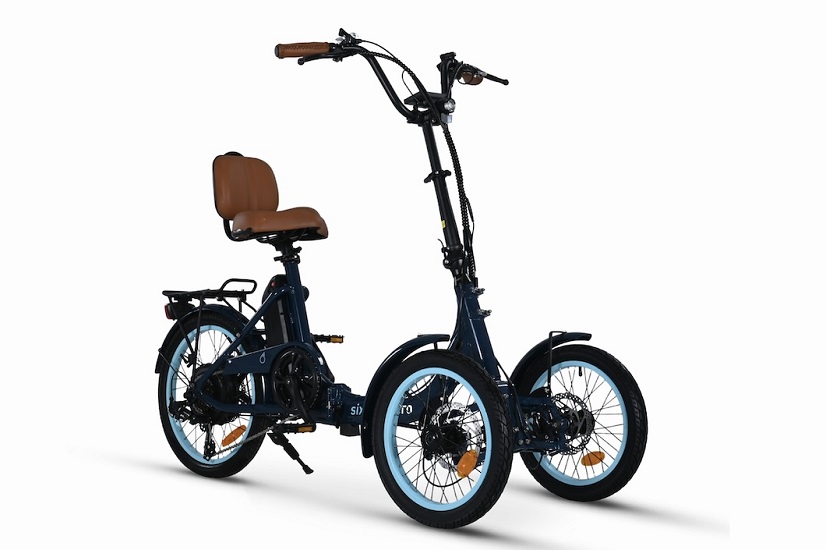
Some links may be affiliate links. We may get paid if you buy something or take an action after clicking one of these.
Riders over the age of 12 but don’t yet have a driver’s license would be required to take and pass the test. Upon passing the test, prospective riders would be required to carry a state-issued ID.
Boerner, said the effort is to make sure both kids and parents understand traffic rules in order to keep kids safe when riding their e-bikes.
The test would be based on safety training published by the California Highway Patrol, in response to AB 1946, also authored by Boerner.
“E-bikes provide that sense of freedom that so many kids and Californians are looking for,” Boener said, “but it’s crucial that we ensure they know how to ride using the rules of our roads, and make safe and smart decisions when sharing the road with cars and pedestrians.”

Some links may be affiliate links. We may get paid if you buy something or take an action after clicking one of these.
In the Netherlands and in many European countries, e-bikes are limited to a maximum output of 250W. This is one of the reasons e-bikes with mid-drive motors are so popular in Europe—a mid-drive motor can provide more assistance than a hub motor can for a given wattage. Why mandate such a low power output? Dutch officials see it as a public safety issue. While pedelecs that go 28 mph (45kph) are available, most e-bikes are restricted to 15.5 mph (25kph). According to the Dutch government, as e-bike use has grown, so have e-bike-rider fatalities, in an equal proportion.
Sponsor
Sponsor
The Dutch government has purchased 247 portable dynamometers that can be positioned in locations with high e-bike traffic and the police can stop riders and test their e-bike’s output. E-bikes that exceed that 250W nominal rating will earn their owners a ticket €290 ($312 USD). A second infraction will result in the same fine, but a third can result in confiscation of the e-bike.

Some links may be affiliate links. We may get paid if you buy something or take an action after clicking one of these.
Photo Credit: Feedback Sports
Until recently, there weren’t many repair stands that could handle an e-bike. Most were made for traditional road and mountain bikes that weigh less than 30 lbs. In the last couple of years some of the top companies producing tools for pro and home mechanics alike have begun introducing stands sturdy enough to make working on your e-bike a cinch. In our survey of the best repair stands for e-bikes we will look at the factors that make for a good repair stand as well as our favorite models on the market.
Let’s take a look at our faves.
Sponsor

The combination of low weight, smooth and skinny tires, large 700C wheels and a lack of suspension give the Velotric T1 HS a particular sort of ride. At low speeds, this e-bike is agile and can wind through a crowded bike path with ease. At higher speeds, it has great road manners and cruises easily. At Class 3 speeds, it’s very stable and gives the rider plenty of confidence.
I’d compare the ride of the Velotric T1 HS to a sporty car. The handling is quick and the suspension stiff, whereas most sedans tend to handle more calmly and feature a gentler rider, suspension-wise.
Velotric chose to equip the T1 with an assortment of rack mounts, which gives this e-bike some added flexibility. For the rider who might want to do some loaded touring (an inn-to-inn tour, perhaps?), the T1 provides an intriguing opportunity.
I mentioned before how I felt like I needed more reach from the saddle to the bar. In part, that’s because Velotric sent us the medium size of the T1 HS. It’s great that Velotric not only makes the T1 in two different frame designs (ST and HS), they offer two different sizes as well. The large features a notably longer top tube (15mm longer), which would have helped my comfort as I seemed to dwarf the medium.
Having built-in GPS was pretty terrific. It improves security and offered a fun perspective on the riding I did. The smartphone app that brings the various functions together, though, was a little buggy; I had to unpair and re-pair my phone a couple of times.
Some links may be affiliate links. We may get paid if you buy something or take an action after clicking one of these.
Yamaha, in its effort to shape how e-bikes are adopted across the globe, has created a new subsidiary called Enyring. The company will offer a battery-swap program for e-bike riders. The service will be launched in the Netherlands and Germany in 2025.
Sponsor
Sponsor
Yamaha plans to work with manufacturers to make compatibility as universal as possible. Presumably, this means standardizing the battery mounts used in e-bikes. Yamaha also has plans to break down old cells so they can be recycled.

Some links may be affiliate links. We may get paid if you buy something or take an action after clicking one of these.
The biggest single change is introduction of the new “Dynamic Screen,” in which the display will switch to different screens based on the terrain the rider is on; the displays will show data relevant to where the rider is riding. For instance, if a rider is going uphill, they will be shown power, cadence and elevation. Once they are headed downhill, they will see current speed in large numbers. Once back on the flats, the display will shift to distance traveled and range.
Sponsor
Sponsor
Riding modes can still be customized in the Flow app. Rather than being restricted to one mode at a time, riders can now select “Auto” mode in the Flow app and it will change modes dynamically, in response to the riding conditions, increasing assistance when going uphill, while dialing it back when going downhill.

Some links may be affiliate links. We may get paid if you buy something or take an action after clicking one of these.
The Strive:ON sits almost perfectly between the Spectral:ON and the Torque:ON. Canyon begins with a carbon fiber frame, same as the Spectral:ON and Torque:ON. Like the Spectral:ON, the Strive:ON comes equipped with 160mm-travel rear suspension, but increases fork travel to 170mm. The big difference comes with the motor. Where the Spectral:ON and Torque:ON come spec’d with Shimano’s EP8 motor, the Strive:ON comes equipped with Bosch’s Performance Line CX motor, one of the most powerful mid-drive motors found on Class 1 eMTBs.
In short, the Strive:ON is the Canyon eMTB for riders who want more power than either the Spectral:ON or Torque:ON produce, with a perfect blending of the best handling attributes of each eMTB.
Sponsor
Sponsor
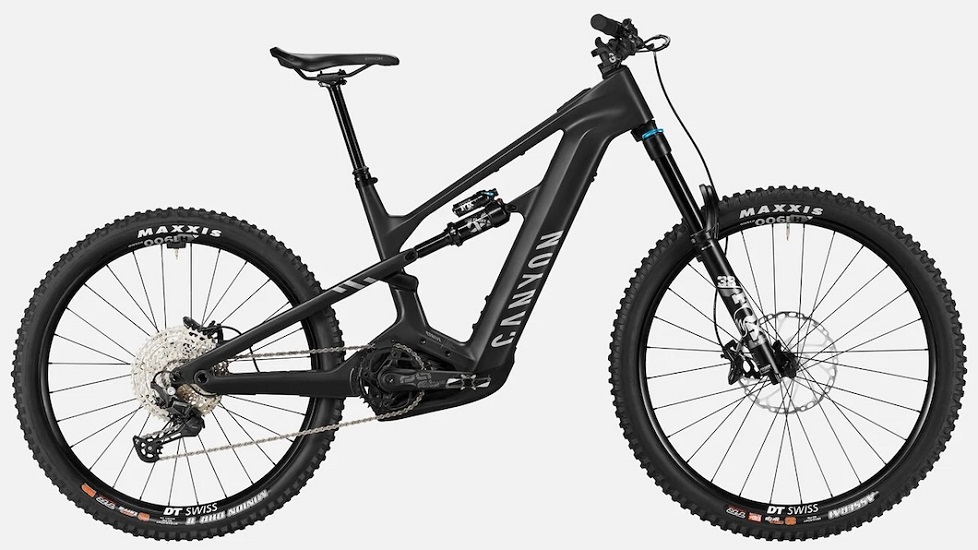
Once a rider has exhausted the charge in their e-bike’s battery, few people face any option than to park their e-bike and recharge it, a process that can take anywhere from three to eight hours, depending on the size of the battery and how quickly the charger can deliver power to the battery—a large battery and a 2-amp charger could require the whole night to replenish the battery.
Clearly, that’s not practical for businesses that may make more than 100 deliveries in a day or riders with long commutes, so cities have begun to examine two different strategies for building infrastructure to meet the needs of e-bike riders.
One option is to follow the example of charging stations such as Tesla’s superchargers, positioning them where e-bike riders are likely to be found. The other option is to offer battery swap stations in similar high-traffic areas. Both have advantages and disadvantages and we’re going to take a dive into what those are.
Charging stations
The simplest option for cities to support e-bike recharging is to offer charging stations. While there are a number of designs for these, with many already in use in Europe and Asia, these typically share the following features: There is a secure rack to which the rider can lock their e-bike and that rack includes an outlet the rider can plug their charger into.
By simply providing a grounded 110V outlet that the rider can plug their charger into, cities can sidestep the issue of the many different charger designs on the market. They provide the power and a secure place to park the e-bike while it charges, and the rest is up to the rider.
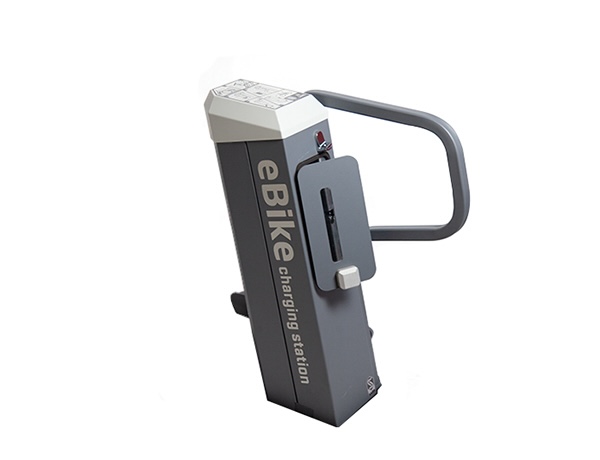
Some links may be affiliate links. We may get paid if you buy something or take an action after clicking one of these.
At just 33 lbs., the Diodra S3 is one of the lightest e-bikes on the planet.
We can’t say we are aware of what the previous lightest bamboo e-bike’s weight was, or even what that bamboo e-bike was, but at 33 lbs. (15kg), we don’t need to make much of an effort to concede Diodra’s claim about the S3. A 33-lb. e-bike is light by any standard, bamboo or otherwise.
The frame isn’t 100 percent bamboo, but we think that doesn’t disqualify them from the claim. The laminated bamboo is bonded to an aluminum head tube and seat tube, which makes sense considering that the headset and bottom bracket bearings need a precision fit in order to work correctly.
Diodra says that the bamboo is weatherproofed with a two-component coating as well as three layers of varnish. The company touts the bamboo’s vibration-damping qualities, which, when combined with aluminum inserts, does dampen nearly all vibration.
The website is short on details, but we know this much: It features a 250W motor that will be limited to 25kph in Europe (15 mph) but will offer a Class 1 top speed of 20 mph here in the U.S. They estimate a range of 63 mi. (100km) with its 300Wh battery and if you’re wondering why you don’t see a battery, that’s because it is contained within the hub along with the motor.
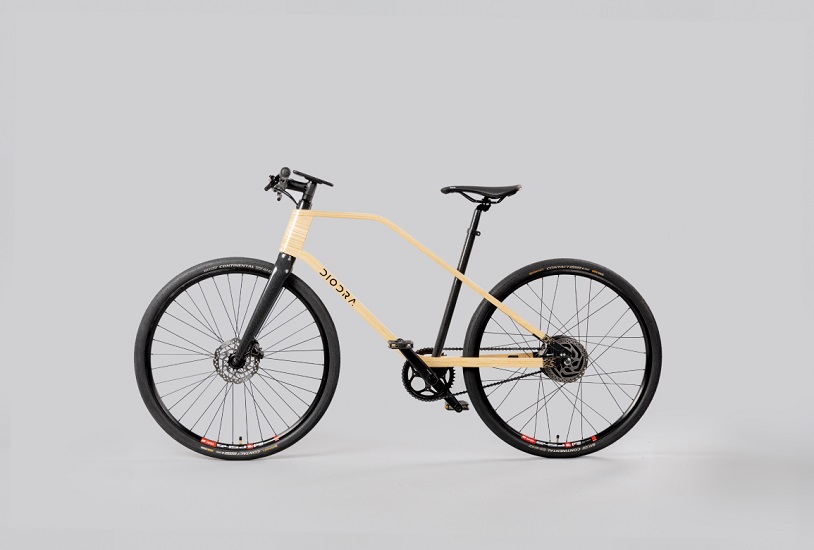
Some links may be affiliate links. We may get paid if you buy something or take an action after clicking one of these.
The bag itself is made from a laminate material called Hexalon that is made to Apidura’s specs. The material is both waterproof and dustproof, making it perfect for carrying electronics. And because it features a dry-bag-style rolldown opening, it can securely carry both batteries and chargers that measure between 8.1 in. (20.5cm) and 11.8 in. (30cm) and are as tall as 2.8 in. (7cm). Total carrying capacity measures 1.6L (98 cu. in.).
The contents of the Apidura Expedition Charging Pack are protected with PU foam, better known as memory foam. Additionally, padded ribs run lengthwise along the Expedition Charging Pack both helping to give the bag shape and to insulate the bike frame from the bag’s contents—and vice versa. The bag attaches to the frame via a single Velcro strap that is silicone-coated to keep it from moving while riding.
Sponsor
Sponsor
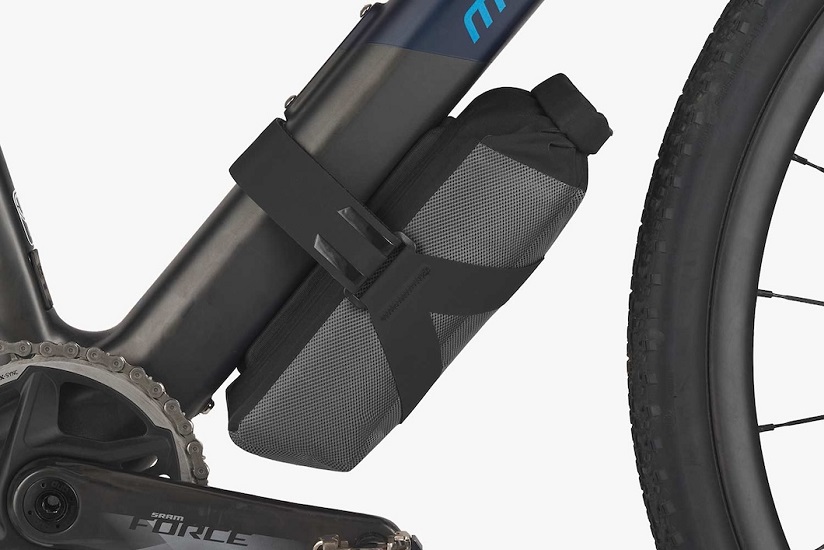
Some links may be affiliate links. We may get paid if you buy something or take an action after clicking one of these.
The next generation of their popular model gains new features and upgrades.
Let’s start with what hasn’t changed, or hasn’t changed much. Vvolt kept the 350W, 45Nm brushless, geared hub motor powered by a 375Wh battery (though that battery now carries UL 2271 certification). This is still a city e-bike with low-profile tires and a single speed (50x22t) drivetrain featuring a Gates belt. And it still has hydraulic disc brakes. Its weight remains nearly unchanged, ticking up from 43 to 44 lbs.
So what’s new? For starters, a new frame design. This low-step frame now has a substantially lower standover height (25-26.5 in. depending on size) and it now comes in three sizes, not two. There aren’t many e-bikes retailing for less than $2000 that come in three distinct frame sizes. Vvolt says they will cover riders from 5 feet up to 6 feet 3. The new frame also has an integrated headlight which gives it a very stylish look.
The Vvolt Alpha 2 now comes with a wider handlebar with more sweep, which will give riders a more upright position, making it easier to look around, whether those views are of nature or traffic. They also spec a longer stem on the medium and large sizes than they do on the small, further dialing fit.
